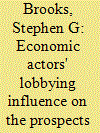| Srl | Item |
| 1 |
ID:
124397


|
|
|
|
|
| Publication |
2013.
|
| Summary/Abstract |
Political scientists and economists have long been interested in the role of special interests in the policymaking process. In the past few years, a series of important new books have argued forcefully that the lobbying activities of economic actors have an important influence on the prospects for war and peace. All of these analyses claim that whether economic actors enhance or decrease the likelihood of conflict ultimately depends on the domestic political balance between economic actors who have a strong vested interest in pushing for peace versus those that do not. I advance two contrary arguments. At least among the advanced states, I posit there are no longer any economic actors who will be favorable toward war and who will lobby the government with this preference. All of the identified mechanisms that previously contributed to such lobbying in these states have been swept away with the end of colonialism and the rise of economic globalization. In particular, I show that the current structure of the global economy now makes it feasible for foreign direct investment to serve as an effective substitute for conquest in a way that was not possible in previous eras. My second argument concerns those economic actors in advanced states with a preference for peace. I posit that it has become unnecessary for them to directly lobby the government to avoid war on economic grounds because economic globalization-the accumulation of decisions by economic actors throughout the globe-now has sufficiently clear economic incentives for leaders.
|
|
|
|
|
|
|
|
|
|
|
|
|
|
|
|
| 2 |
ID:
112247


|
|
|
|
|
| Publication |
2012.
|
| Summary/Abstract |
Almost all countries have issued laws and regulations to promote renewable energy (RE). However, the applications and motivations of such laws as well as achievements have been different. Currently, the Japanese government has announced its targets to expand the electricity feed-in tariff scheme for solar power, along with other energy sources, within two years to meet the goal set by the Japanese Prime Minister who, in the 15th United Nations Climate Change Conference (COP15) held in September 2009, proclaimed to cut 25% of greenhouse gas (GHG) emissions from the 1990 levels by 2020. In this paper, the current Japanese energy policies and measures for promoting RE in comparison to popular methods followed worldwide are explored. Furthermore, a Least Cost Feed-in Tariff (LCFIT) Simulation Model for Japanese case was developed to calculate the optimal mix of technologies to reach certain targets. The LCFIT also calculates the tariff that should be proposed for each technology and the total cost for the program with and without a carbon tax and estimates the premium added to the bill of the customer every month.
|
|
|
|
|
|
|
|
|
|
|
|
|
|
|
|